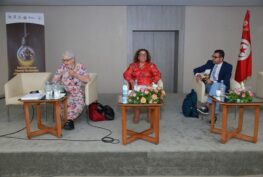Mr/ Alaa Shalaby speech
Ladies and gentlemen,
Allow me to express, on my behalf and on behalf of the Board of Trustees of the Arab Organization for Human Rights, our pleasure at holding this national symposium on the issue of the modernization of penal legislation in Egypt, which is becoming increasingly important in terms of the great interest of the Organization in Egypt’s leadership role and its important influence in its Arab environment, The role that we aspire to extend to human rights issue to deserve as a priority on the Arab agenda to address the major challenges facing our Arab nation at this delicate stage, as this symposium was held after about a year and a half of the positive movement of the Egyptian state in terms of attention to develop its interaction and commitment to human rights.
Arab organization for human rights affirmed in its mission since its founding in 1983, on the promotion of the protection and respect for human rights, and the dissemination and belief of human rights is the key to promoting stability, security, development, social peace and national unity and addresses all issues and challenges.
In terms of the Organization’s ongoing efforts to protect human rights and address violations, the legislative reform issues, especially thecriminal reform, have been a major concern on the agenda of the Organization, leading to the implementation of a large number of activities and projects on this subject, Constitutes a key pillar of our common goal of justice and human dignity, The recent current project to strengthen the support of civil society in the promotion of criminal justice, the containment of heavy penalties, including the reduction of the death penalty, and the promotion of fair trial conditions in practice through a variety of measures, and address violations.
The symposium was the fifth in a series of events organized by the Arab Organization for Human Rights in the context of the international project. The previous four events, which led to the expert table and the workshop in October last year, with the participation of the Egyptian state with its three powers, constitute an exceptional development process in building consensus and ideas, And the practical proposals that came today to be crystallized as a shared vision of complementarity and harmony, setting a framework of priorities and steps to achieve our common goals as soon as possible and in accordance with recognized means.
It should be noted that the development in Egypt through the development of the institutional structure of human rights and the strengthening of response and interaction with human rights issues and concerns is still below the level, and represent the issues of criminal reform in the forefront.
Allow me to convey to you the conclusion of the Board of Trustees of the Arab Organization for Human Rights at its meeting in 5thApril 2019 concerning the situation in Egypt, The Council welcomed the initiative of the President of the Republic to address the crisis of civil action in Egypt and welcomed the announcement by the Minister of Social Solidarity The existing law is the source of the crisis and the principles it has announced that meet the demands of civil society and human rights groups, and we look forward to the final draft to show how these goals are achieved.
At the same time, we renew our call to the Egyptian authorities to limit the use of the death penalty in legislation, justice and practice. We urge them to go to the suspension, as is officially the case in Algeria and in reality in Morocco and Tunisia, and has been partially applied in other similar Arab contexts. We also urge them to strengthen their concrete efforts to account for crimes of torture and ill-treatment by filling the legislative shortfall in criminalization and aggravating punishment.
Ladies and Gentlemen
Allow me also to express my thanks and appreciation to the Egyptian state institutions which have accepted the invitation to participate actively in this symposium and to take the opportunity of serious community dialogue aimed at building national consensus on the issues of modernization of the criminal law system.
As well as thanks to my colleagues in civil society institutions and concerned national institutions, as well as leading leaders in the fields of law from universities, research centers and media friends.
And , Special thanks to the National Council for Human Rights, which is always involved in working on important issues in Egypt, and its Chairman, Mr. Mohammed Faik, the founding father of the Arab Organization for Human Rights and the dean of the human rights movement in our Arab country.
And extended thanks to the partners in the international project: Hands of Cain, Italy and the Arab Institute for Human Rights, our regional institution in Tunisia, and the Somali Women’s Agenda.
And appreciation to my dear colleagues, headed by Professor “Maha Al-Barges”, Secretary-General of the Organization and members of the Secretariat.
All the good wishes for a fruitful interactive dialogue, and look forward to a collective consensus that outlines a common map of action towards the modernization of penal legislation in Egypt and the development and strengthening of criminal justice.










No Comments